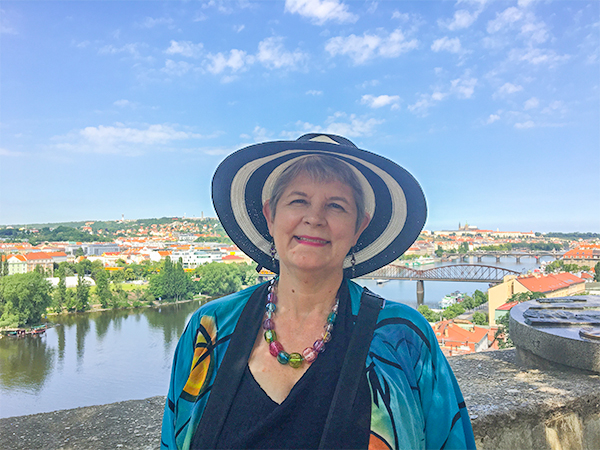Learn About a Lecturer: Rebecca Vargha Brings a Varied Background to Specialized Information Agencies & Services Course

Location: Durham/Chapel Hill, NC
Academic Background: Bachelor’s degree in English literature from University of North Carolina, Chapel Hill.; master’s degree in library science from UNC, Chapel Hill
Current position: I am the head librarian at the University of North Carolina School of Information and Library Science. It’s a fairly rare model these days, back in the day, when you had more stand-alone libraries and branch libraries, some library schools would have a free-standing library. But it’s fun, because I look at it like a learning lab. I have anywhere from eight to 10 students working in our library, undergrad and graduate students, and we’re open 80 hours a week. We have 110,000 volumes in our collection. I do everything you’d do in a library with the exception of cataloging, which is done through the main library.
Previous positions: I actually was very fortunate in grad school and started working at a think tank, the National Humanities Center, a not-for-profit organization, and it’s the only institution devoted completely to humanities. I worked there for 14 years, it was amazing. It was a special library, very specialized, and the National Humanities Center borrows from Duke, North Carolina State and UNC Chapel Hill, and that’s how I got to know those collections. I was the associate librarian there for 14 years, and then technology happened and I went to work for a software company, SAS – if you do stats, there’s two biggies in the field SAS and SPSS. I was their corporate librarian at SAS in the research and development side of the business, and worked with software developers.
Then I had a job offer from Nortel – which was telecommunications, making phone switches, voice mail systems and things like that – it no longer exists. That brought me back to Research Triangle Park, North Carolina. So Nortel was wonderful, I loved it. They were a global company, and I was a senior research analyst. In 2001 I got laid off and it gave me the opportunity to come back to UNC, and that’s where I’ve been ever since.
How did you become a librarian?
I’m a native North Carolinian, my family has been here a long, long time, and there was a conspiracy in the small town where I grew up in. There were three librarians who decided that they were going to recruit me to the profession. I’d worked in the high school library, and Ms. Wilson, who was the town librarian at the time, she always went on vacation for two weeks at the beach. She asked if I’d like to run the (very small town) library while she was gone. She had handed me the keys to the kingdom, little did I know.
How did you become a lecturer at SIS?
It was through my professional work with IFLA (International Federation of Library Associations). I know some of the University of Tennessee faculty and the former director, Ed Cortez, and they needed someone to teach online. It is fun, I really enjoy it. And of course Diane Kelly was a faculty member at UNC, so I had known Diane for a long time. The world is really small, especially in terms of library schools.
What class do you teach at SIS?
The class is 553, Specialized Information Agencies and Services. Special libraries are really my forte, I talk about a lot of government and federal libraries, with an emphasis on client-centered systems in the profit and not-for-profit sectors. I do everything but public and school libraries – the library I work at, at UNC, is very specialized. I do everything from traditional library science, and because I did work with the software library, I do the computer science stuff as well.
We’re teaching business research, how to size a market, how to do knowledge management. There’s a lot packed into it, as it is with summer classes. I do a lot of global work so I also bring a global focus. And it’s also about using databases, especially business databases.
Who takes your class?
I’ve had students who are getting ready to graduate, and people who are fairly new to graduate school. I’ve got a lot of people who work in an academic environment, and others who work in the for-profit. Also, the range of experience is all over the place – people straight out of undergrad, and others who have been working for decades. It brings a richness to it that you wouldn’t have if you had a really homogenous group where people are all the same.
Why should students be interested in information sciences?
The reality is, that it’s still very exciting to live in the times we’re living in, and fields like knowledge management – that’s where the jobs are. We need to manage information, and we have the skills to do that. There’s a stereotype of people who are librarians, but this is about access to information, managing information, and coming out with the degree now is a very exciting time to live in. This course really expands the imagination to the jobs – it’s just not the traditional brick and mortar jobs.